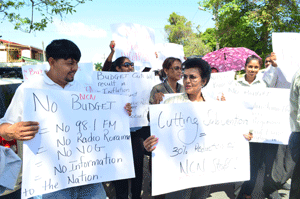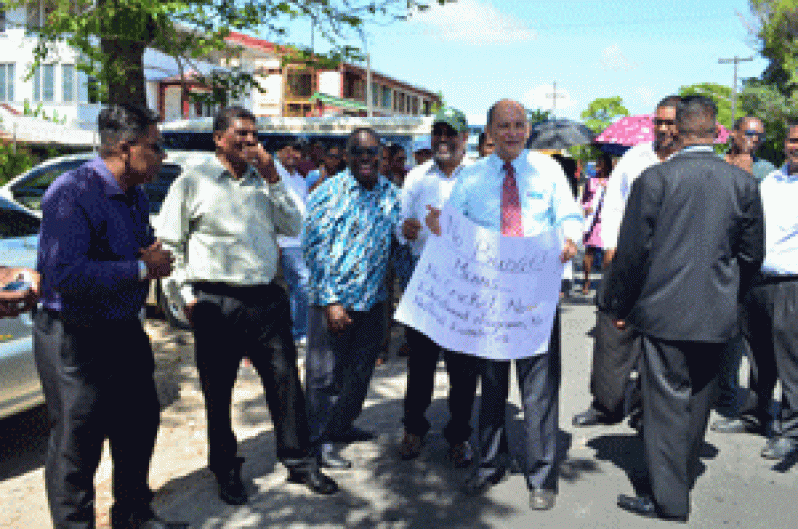ACTING Chancellor of the Judiciary, Justice Carl Singh has observed that gender discrimination is an area of the law not being actively litigated in the courts by Guyanese lawyers.  However, the non-pursuit of such litigation does not, necessarily, mean that Guyana does not have a problem in this regard, he said.
However, the non-pursuit of such litigation does not, necessarily, mean that Guyana does not have a problem in this regard, he said.
Conceding it may mean that our legal luminaries are not rising to the challenge when the opportunity arises, the Chancellor urged members of the practising Bar, to give the Bench the opportunity, when possible, to make a contribution and to develop, jurisprudentially, in that area of the law.
Justice Singh made the remarks, last Friday, as he delivered the keynote address at the start of a two-day Colloquium for Magistrates at Georgetown Club, under the theme ‘Gender, Domestic Violence and the Courts.’
He noted that gender discrimination is an area of the law that permits discourse on a wide range of issues, including the application of international human rights laws in the resolution of related based issues.
Notwithstanding, it is an area, as far as he is aware, that does not come regularly before a judge locally.
“It is not an area, I believe, that is actively presented to the Courts by the lawyers of Guyana and I thought from this, that one should not be persuaded to believe that the absence of gender discrimination litigation before our Courts, necessarily means that Guyana does not have a problem,” he said.
Justice Singh opined the situation that obtains may derive from an  uneducated state of the affected persons in relation to their rights.
uneducated state of the affected persons in relation to their rights.
NOT RISING
“Or it may mean that members of the practising Bar are not rising to the challenge when the opportunity arises.”
He said, hopefully, the colloquium will help to identify new and important methods to deal with cases of domestic violence and gender discrimination.
The Chancellor said he would like to see, coming out of the discussions:
* meaningful and adequate protection, as far as the law permits, for the victims of domestic violence, at the earliest time;
* a display of awareness and sensitivity, by magistrates, of the special nature of domestic violence cases which come before the Courts;
* an understanding, by judges and magistrates, of the way domestic violence hurts and how victims and their children are affected by the procedures adopted;
* the implementation of more effective mechanisms which hold the domestic violence offenders accountable for their actions, and
* most importantly, improved work and efforts to create greater confidence in the wider observing and affected community, that the justice system is effectively addressing gender issues and domestic violence.
On the widely ventilated issue of domestic violence and the manner in which such cases are handled when before the Courts, the Chancellor called on magistrates to deal with them promptly and advised that they should be handled with special sensitivity.
 SPECIAL NEEDS
SPECIAL NEEDS
Justice Singh, who noted that complainants in domestic violence matters have special needs and concerns, said that they should be treated differently from persons in any regular assault matter.
He expressed concern that there have been reports about inappropriate remarks and comments to victims in such cases emanating from the Magisterial Bench.
He said, too, that there have been reports of a blatant lack of consideration to the, often times, delicate and sensitive nature of domestic violence complaints.
“I want to say, I do not hold myself to be an expert in these matters, but there is enough information available to suggest that the domestic violence complaints should not be treated as would be a complaint, of say, a regular assault case,” the Head of the Judiciary remarked.
He declared that the complainant in a domestic violence case is differently placed from the victim of assault in a ‘rum shop brawl’ or the ‘marketplace pugilistic encounter’.
Justice Singh also elaborated on the impact domestic violence proceedings can have on the home and family, especially where female complainants are dependent on an abusive partner for financial assistance, or may be living in a home with the relatives of the abuser, ultimately, affecting the stability of the home.
He said those are all conditions which speak to the need for a special sensitivity, by magistrates, in such circumstances, noting that the domestic violence legislation provides magistrates with a range of options to quickly and appropriately provide for the safety of the complainants.
Referring to delays in making appropriate interventions by the Courts, as it relates to domestic violence cases, the Chancellor stressed the importance of the timely handling of such matters, adding that there are frequent complaints about protracted hearings in relation to domestic violence matters.
There are reports, too, of violation of statutory procedures with respect to hearings related to domestic violence cases, he said.
Such delays, the Chancellor said, allow more time to an abuser to influence, persuade and, eventually, convince his victim to become uncooperative with the Court system and not to pursue the complaint.
Said Justice Singh: “I would like to take the opportunity to focus on the importance of timely intervention, because timely intervention can prevent serious bodily injury.”
In this regard, he said the State has an important role to play in performing a “timely and important balancing act.”
Among the distinguished gathering at the opening of the colloquium were Prime Minister Samuel Hinds, Attorney General Anil Nandlall, Minister of Health Dr. Bheri Ramsaran, other Parliamentarians, Members of the Diplomatic Corps, Members of the Judiciary, practising lawyers and senior officers of the Guyana Police Force (GPF).



.jpg)









